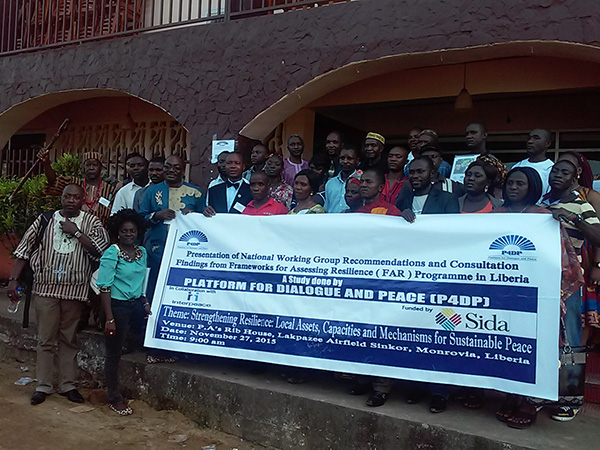The Platform for Dialogue and Peace (P4DP) convenes a stakeholder forum on resilience in Monrovia

On Friday November 27, the Platform for Dialogue and Peace (P4DP) hosted a validation forum in Monrovia to present the recommendations of the National Working Group (NWG) on Resilience, an initiative that began in June, following on from nationwide consultations on resilience.
P4DP has been working alongside Interpeace as part of the Frameworks for Assessing Resilience (FAR) programme to document the strengths that Liberians possess. This is a key step towards understanding the strategies that exist within Liberian society to resolve conflicts peacefully.
The 2014 Ebola virus epidemic has proven to be a real test of Liberian society’s resilience. The epidemic claimed thousands of lives and came only a decade after the 2003 Peace Accords ended a protracted period of civil war. The health crisis affected Liberia’s social fabric, and put a strain on already weak state-society relationships. However, it should be noted that of the three most affected countries in West Africa, Liberia was the first to be declared Ebola-free even if a small number of new cases have re-appeared since.
To understand what allows Liberians to face up to adversity of this kind, and transform it into an opportunity to build peace, P4DP undertook eight months of intensive field research and engaged over 1,100 Liberians from all 15 counties and across all sectors of society. The findings were documented in a Country Note that served as the basis for the National Working Group, whose mandate was to develop strategies and policy recommendations to strengthen resilience by building upon factors identified in the consultation phase.
More than 65 people attended the validation forum including county representatives who had participated in the initial consultations, as well as members of civil society organisations and government institutions based in Monrovia. Over the course of the one day workshop, participants had the opportunity to hear both the key findings of the consultation and the principal recommendations that the National Working Group developed. Participants were given the opportunity to share their thoughts on the recommendations during discussion groups.
“These recommendations are practical structures that we can build upon to take Liberia to the next level,” Marie Kolenky, a member of the Working Group and deputy director of the Liberia Opportunity Industrialization Center (LOIC), noted on behalf of the NWG.
Stakeholders present at the workshop prioritized the following recommendations, which they believed would best strengthen the resilience of Liberians:
- Support to women’s livelihood and participation in economic activities through affirmative actions and targeted programmes that build upon existing women solidarity initiatives. Examples include:
- Strengthening support to cross border women traders to cope with and overcome harassment,
- Encouraging community dialogues,
- Implementing cash transfer programmes for the most vulnerable women, and
- Creating awareness around the inheritance law and advocating for harmonization between customary and statutory marriage laws
- Build on the findings of the research to establish an ‘architecture for resilience’ along the lines of the ‘architecture for peace’ dialogue mechanism that mediates and supports peaceful resolution of community disputes. This would be especially relevant to pervasive issues of Sexual and Gender Based violence and land/property disputes that exist throughout the country and tend to manifest at the local, community level. The coping mechanism, and initiatives to transform these different forms of violence, and which have been identified over the course of this research, could serve as the basis for the dialogue and dispute resolution processes and should engage traditional leaders and chiefs, youth, women and people with disabilities.
- Continue to provide and strengthen empowerment programmes for youths whilst also creating economic opportunities for them. Disenfranchised youth represent a big threat to the stability of the country and are easily drawn into criminal networks or engage in petty crimes when they are economically, socially and politically excluded. Raising political awareness on this issue is also necessary.
For James S. Shilue, the executive director of P4DP, the resilience orientation of this programme highlights the importance of inclusion and collaboration between different sectors of society. He said that going forward it will be important when implementing each of these recommendations that “we adopt a tripartite approach which engages state actors, prioritizes community involvement and draws on local and international civil society.”
